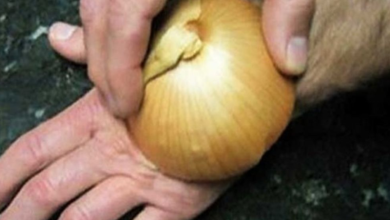
The sense of smell, often overshadowed by sight and hearing, has recently gained attention for its complexity and impact on our lives. While we’ve long known that smells evoke memories and emotions, new research reveals a surprising ability: our noses may detect the scent of impending death. This discovery highlights the untapped potential of our olfactory system, revealing a profound connection between smell and the human experience.

This article will explore the fascinating connection between our sense of smell and mortality, revealing how our olfactory system can sense the presence of death, a phenomenon that challenges our understanding of life and its mysteries.
The Nose’s Secret Knowledge – Unveiling the Mysteries of Smell

Our sense of smell, often overlooked in favor of our more dominant senses, has always played an essential role in human survival. It helps us detect spoiled food, sense danger, and even find food. But there’s a fascinating secret that the nose has been keeping — it can sense impending death. This groundbreaking discovery comes from research led by Arnaud Wisman at the University of Kent’s School of Psychology.
Though we may not always be aware of it, our noses are constantly working, interpreting the hidden messages in the scents around us. Imagine being near someone who’s nearing the end of their life and suddenly feeling an overwhelming sense of impending loss. It might seem like a strange, unexplainable feeling, but it could be your nose acting as a quiet messenger, delivering an important olfactory clue.
Research has shown that as our bodies begin to break down, they emit a specific scent, signaling the approach of death. This finding taps into our deep-seated instincts, which often remain outside our conscious awareness. It raises the intriguing possibility that our ancestors might have also been subconsciously aware of this scent when near someone nearing death.
This particular smell is linked to a chemical called putrescine, which is released by decaying tissues. While it might not be something we consciously recognize or connect with death in our daily lives, it’s as if our primal survival mechanisms are responding to it. The reaction it triggers is deeply rooted in our biology, invoking a fight or flight response that speaks to our ancient survival instincts. The connection between our sense of smell and our deepest survival instincts becomes apparent, as if our noses have been quietly guarding this knowledge throughout history.
The Enigmatic Putrescine – The Scent That Triggers Our Survival Instincts
At the core of this intriguing discovery is a molecule with a chilling reputation – putrescine. This chemical is produced during the decomposition of tissues and holds a mysterious significance that goes beyond our daily lives. While putrescine isn’t something we typically encounter, and the average person may not immediately associate it with death or danger, our brains seem to have an extraordinary capacity to detect and react to it, often without our conscious awareness.
The link between our subconscious response to putrescine and our ancient survival mechanisms reveals the complex interplay of evolution. Over time, humans have come to link death and decay with potential threats, particularly in the form of disease. Our ancestors would have been at risk of food, water, or environmental contamination, which could lead to illness or death. As a result, our sense of smell evolved to become highly attuned to the scent of decay, including putrescine.
When we detect even the faintest trace of putrescine, our bodies trigger a cascade of ancient instincts. It’s as if an ancestral alarm system is activated, echoing the age-old fight-or-flight response that has kept our species safe for generations. The smell of putrescine becomes a quiet sentinel, alerting us to possible danger and prompting us to take action for our survival.
This fascinating connection between our sense of smell and our deep-rooted survival instincts underscores the lasting influence of scent on human evolution. It highlights the hidden wisdom of our noses, which have silently protected us from the unseen threats that have shaped our history. Putrescine, in essence, serves as a reminder of the primal forces that continue to shape our behaviors, even in today’s modern, technologically advanced world.
The Language of Scents – How Our Sense of Smell Shapes Our Lives

Amidst the symphony of our senses, the olfactory system often takes on the role of a quiet conductor, subtly shaping our thoughts, emotions, and actions. While sight and sound may dominate our active awareness, our sense of smell operates behind the scenes, exerting its influence in ways we may not even realize. Its significance in human evolution and survival is profound and should not be overlooked.
In an era where technological advancements are moving at lightning speed, often overshadowing our innate instincts, our sense of smell remains a constant protector of our well-being. It is a vital force in our lives, particularly in matters related to health. The connection between our health and our sense of smell runs far deeper than simply detecting spoiled food or alerting us to danger.
Take, for instance, the curious phenomenon of phantom smells. In this intriguing occurrence, individuals may sense odors that aren’t actually present. This mysterious phenomenon may act as an early warning system, indicating potential health issues or sensory distortions. It suggests that our noses could be sending us subtle signals about our internal state, often long before we consciously pick up on them.
Yet, the influence of scent extends far beyond our individual experience. Pheromones, those invisible chemicals our bodies produce, communicate silently with others in our social world. These unnoticed signals, imperceptible to our conscious awareness, hold the power to shape how we connect with friends, family, and even romantic prospects.
When it comes to attraction and social interactions, pheromones play an essential role. They can evoke emotions of attraction, ease, or even discomfort in those around us. The delicate interplay of pheromone communication demonstrates the intricate nature of our olfactory system and its significant role in shaping our social fabric.
Despite being often overlooked, our sense of smell is an integral part of the human experience. It subtly guides us in matters of health and social connection, weaving its influence throughout our everyday lives. Phantom smells and the mysterious power of pheromones remind us of the complex, often hidden, language of scent that transcends our conscious understanding. Through the dance of molecules and neurons, our olfactory system continues to influence the subtler dimensions of our existence, enriching the tapestry of human experience.
The Unseen Communicators – Emotions in the Scented Realm

In the complex web of human interactions, we are typically dependent on verbal language and facial expressions to communicate our emotions and thoughts. However, what if there was another, more subtle form of communication—one that transcends words and gestures? According to Arnaud Wisman’s groundbreaking research, our bodies possess a remarkable ability to convey emotions such as fear and stress through the invisible language of scent. In a world where emotions no longer stay locked inside but are released into the air around us, our olfactory system becomes an unexpected yet powerful medium for expressing our innermost feelings.
Imagine a situation where the air around you carries the faint trace of anxiety, a scent others can pick up even before you speak a word. It’s as if your emotions have found their voice in the realm of scent, giving others a silent signal of your emotional state. This discovery challenges the conventional boundaries of human interaction and opens up a whole new world for understanding the subtle layers of how we connect with those around us.
Picture entering a room filled with the sweet, uplifting fragrance of joy. The very air seems to surround you with a sense of happiness, subtly boosting your mood. On the flip side, walking into an environment thick with the scent of tension and stress can make you feel uneasy, even before any conversation begins. These experiences suggest that our emotions are not only felt within but can also manifest in the scents we emit, quietly influencing the way we relate to one another and navigate our surroundings.
The implications of this revelation are profound. It invites us to reconsider the impact of our emotions on both our environment and the people around us. It raises intriguing questions: Could we learn to interpret the emotional scents of others? Could we use this knowledge to offer support, understanding, or space, all without uttering a single word?
In a world where words often fail to capture the full depth of human experience, the olfactory system opens a new realm of untapped potential. It provides a unique and powerful way to express emotions, offering a more nuanced and instinctive form of communication that extends far beyond language and physical expression.
Harnessing the Power of Scent for a Healthy Lifestyle – Embracing the Scented Path to Wellness

Now that we’ve uncovered the fascinating secrets of our olfactory system and its profound links to emotions and mortality, it’s time to turn this knowledge into practical steps for enhancing your well-being. Let’s dive into some useful ways to bring the power of scent into your daily life, harnessing the wisdom of our noses for a healthier, more fulfilling existence.
Aromatherapy:
Explore the world of aromatherapy, where essential oils become powerful allies in boosting mood and supporting overall health. Consider lavender to unwind after a busy day, energizing citrus scents in the morning, or eucalyptus for moments of mental clarity. With the right selection of essential oils, you can create a personalized scented journey that suits your needs and preferences.
Mindful Breathing:
Take advantage of mindful breathing techniques by using scents as anchors for relaxation and stress relief. When you inhale the calming aroma of lavender or the grounding scent of sandalwood, allow it to guide you into a state of calm and mindfulness. Practice deep, purposeful breathing, letting the scent center you in the present moment, easing both your mind and body.
Scented Spaces:
Transform your living and working environments into serene sanctuaries with scented candles, essential oil diffusers, or fresh flowers. The scents you choose can significantly influence your mood and productivity. Opt for cozy, comforting scents like vanilla and cinnamon for evening relaxation, or vibrant, citrusy aromas to energize your workspace and enhance focus.
Fragrant Foods:
Embrace the deep connection between taste and smell by indulging in aromatic foods. Incorporate flavorful herbs and spices like basil, rosemary, and thyme into your meals, infusing your dishes with delightful scents and tastes. Sip on aromatic teas like chamomile or mint to relax your senses and promote a sense of tranquility.
Explore Nature:
Nature’s scents have a unique ability to soothe and rejuvenate. Spend time in natural settings—a stroll through a pine forest, a visit to a blooming garden, or a day by the ocean. These experiences allow you to connect with the fragrances of the outdoors, grounding yourself in the refreshing and calming smells of nature. Nature’s scents can serve as a balm for your spirit, offering a peaceful escape from the hustle and bustle of everyday life.
By weaving the art of scent into your daily routine, you not only improve your well-being but also honor the silent wisdom of your olfactory system. Embracing the scented path to wellness connects you to ancient knowledge that your nose carries, using its power to elevate your mood, reduce stress, and foster a deeper connection with the world around you. As you journey along this fragrant path, you may find that the subtle language of scents has the potential to transform your life, one mindful breath at a time.







